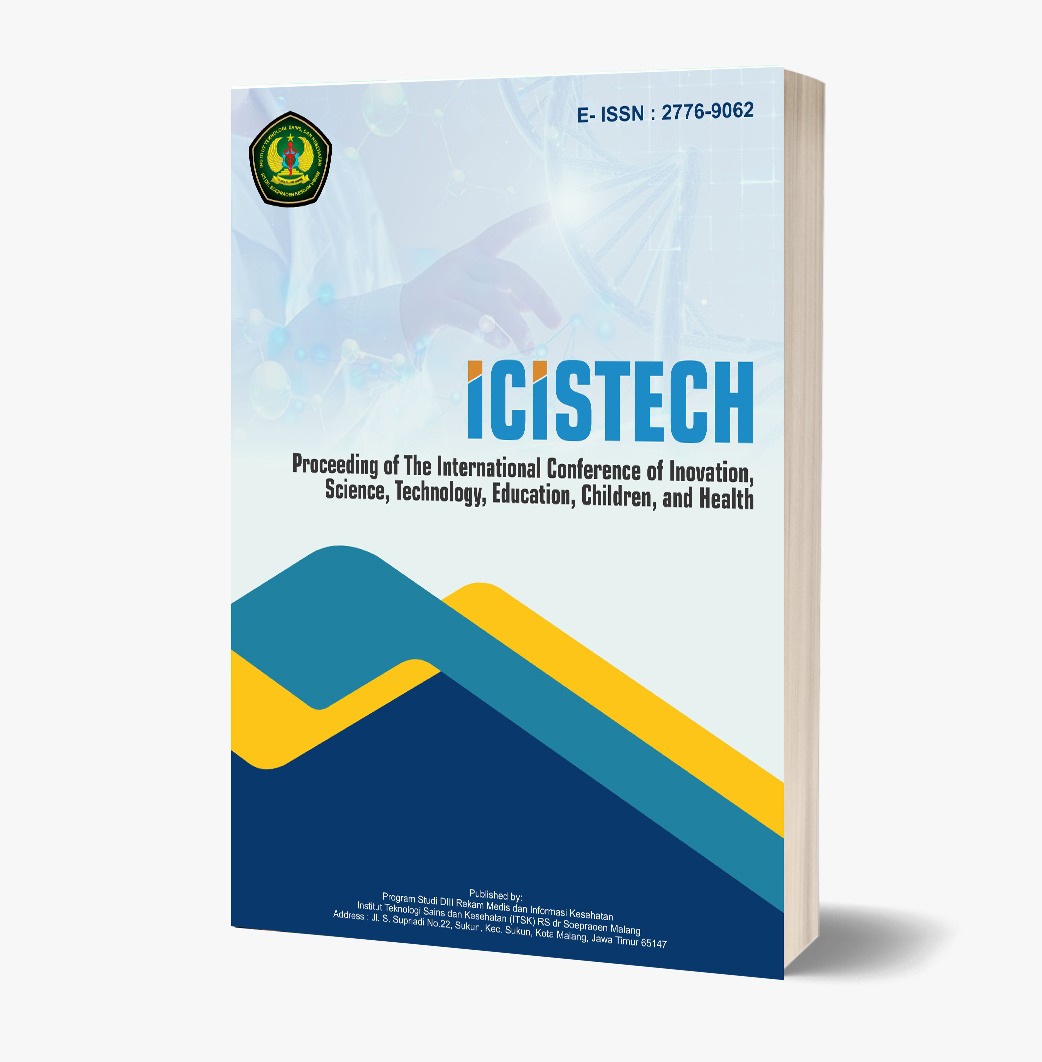The Relationship Between Pregnant Women With Kek and The Birth of Lbw Babies in The Work Area of Bere-Bere Community Health Center
DOI:
https://doi.org/10.62951/icistech.v5i1.227Keywords:
Chronic Energy Deficiency, Low Birth Weigh, Nutrition , Pregnancy, Pregnant WomenAbstract
Background: Low Birth Weight (LBW) is one of the indicators of infant health that is greatly influenced by the nutritional status of the mother during pregnancy. Pregnant women with poor nutritional status have a higher risk of giving birth to babies with low birth weight. This study was conducted to examine the relationship between the nutritional status of pregnant women and the incidence of LBW in the work area of bere-bere community health center work area. Objective: This study aims to determine the relationship between the nutritional status of pregnant women and the incidence of LBW at the work area of bere-bere community health center in 2023. Method: This study used an observational analytical design with a cross-sectional approach. The number of respondents was 16 pregnant women selected through a purposive sampling technique. Data were collected by measuring nutritional status using Body Mass Index (BMI) before pregnancy and collecting medical record data on the baby's birth weight. Statistical analysis was performed using the Chi-Square test with a significance level of 0.05. Results: Based on the results of the analysis, it was found that out of 16 respondents, 6 pregnant women (37.5%) with poor nutritional status gave birth to babies with LBW, while 10 pregnant women (62.5%) with normal nutritional status gave birth to babies with normal weight. The results of the statistical test showed a p-value of 0.000 (p < 0.05), which indicated a significant relationship between the nutritional status of pregnant women and the incidence of LBW. Conclusion: There is a significant relationship between the nutritional status of pregnant women and the incidence of LBW. Pregnant women with poor nutritional status have a higher risk of giving birth to babies with LBW. Suggestion: It is recommended that health workers at the work area of bere-bere community health center be more active in providing education and monitoring the nutritional status of pregnant women through nutritional counseling and regular pregnancy check-ups. Nutrition intervention programs also need to be strengthened to prevent the incidence of LBW
References
American College of Obstetricians and Gynecologists. (2017). Practice Bulletin No. 179: Bacterial Vaginosis in Pregnancy. Obstetrics & Gynecology, 130(2), e1-e17.
Black, R. E., Victora, C. G., Walker, S. P., Bhutta, Z. A., Christian, P., de Onis, M., ... & Uauy, R. (2013). Maternal and child undernutrition and overweight in low-income and middle-income countries. The Lancet, 382(9890), 427-451.
Dinh, H. T., Nguyen, T. M., & Nguyen, Q. T. (2020). Factors influencing maternal health care utilization in Vietnam: A cross-sectional study. BMC Public Health, 20(1), 1245. https://doi.org/10.1186/s12889-020-08987-5
Indrawati, S. (2014). Hubungan Status Gizi Ibu Hamil dengan Kejadian BBLR di Puskesmas Minggir Sleman Yogyakarta. Universitas 'Aisyiyah Yogyakarta. DIGILIB.UNISAYOGYA.AC.ID
Koye, D. N., & Yusuf, N. (2015). Maternal health care service utilization and its determinants among rural women in Ethiopia. BMC Pregnancy and Childbirth, 15(1), 139. https://doi.org/10.1186/s12884-015-0622-7
Li, M., Guo, Y., & Li, X. (2018). Antenatal care and its impact on maternal and neonatal health outcomes in China. PLOS ONE, 13(6), e0199560. https://doi.org/10.1371/journal.pone.0199560
Lubaba, Z. (2017). Hubungan Status Gizi Ibu Hamil dengan Kejadian BBLR di Puskesmas Hikun Kabupaten Tabalong. Skripsi DIV Kebidanan, Universitas Sari Mulia. REPOSITORY UNIVERSITAS SARI MULIA
Mazita, N., et al. (2019). Hubungan Status Gizi dan Usia Ibu Hamil dengan Kejadian BBLR di Kota Makassar. Jurnal Kesehatan Masyarakat, 15(1), 25-32. JURNALP4I.COM
Nair, S. S., & Goudar, S. S. (2015). Utilization of antenatal care and its impact on maternal and neonatal health outcomes in rural areas of India: A cohort study. BMC Pregnancy and Childbirth, 15(1), 73. https://doi.org/10.1186/s12884-015-0482-0
Purwanti, Y. (2017). Hubungan Perilaku Ibu dengan Status Gizi Balita di Wilayah Kerja Puskesmas Hikun Kabupaten Tabalong. Skripsi DIV Kebidanan, Universitas Sari Mulia. REPOSITORY UNIVERSITAS SARI MULIA
Rahmawati, D. (2023). Hubungan Status Gizi Ibu Hamil dengan Berat Badan Lahir Rendah (BBLR) di Rumah Sakit St. Madyang Kota Palopo. UNM Environmental Journal, 6(3), 52-58. UNM JOURNAL
Sari, D. P., & Widijati, J. (2019). Hubungan Status Gizi Ibu Hamil dengan Kejadian Bayi Berat Lahir Rendah di Wilayah Kerja UPTD Puskesmas Ngarip Kecamatan Ulu Belu Tahun 2019. Jurnal Gizi dan Kesehatan, 10(2), 123-130. JOURNAL.AISYAHUNIVERSITY.AC.ID
Sari, D. P., & Widijati, J. (2019). Hubungan Status Gizi Ibu Hamil dengan Kejadian Bayi Berat Lahir Rendah di Wilayah Kerja UPTD Puskesmas Ngarip Kecamatan Ulu Belu Tahun 2019. Jurnal Gizi dan Kesehatan, 10(2), 123-130. JOURNAL.AISYAHUNIVERSITY.AC.ID
Sari, D. P., & Widijati, J. (2020). Hubungan Status Gizi Ibu Hamil dengan Kejadian BBLR di PMB Johana Widijati Kabupaten Tulungagung. Jurnal Bidan, 6(1), 45-52. JOURNAL.UNITA.AC.ID
Skripsi Ners B. (2013). Hubungan Status Gizi dengan Derajat Hipertensi di Wilayah Kerja UPT Puskesmas Jaro Kabupaten Tabalong. SCRIBD
Titaley, C. R., Dibley, M. J., & Roberts, C. L. (2010). Determinants of maternal health care utilization in Indonesia: A multilevel analysis. BMC Public Health, 10(1), 264. https://doi.org/10.1186/1471-2458-10-264
WHO. (2015). Global Nutrition Targets 2025: Policy Brief Series. World Health Organization.
WHO. (2016). Guideline: Daily iron and folic acid supplementation in pregnant women. World Health ntul. Jurnal Kebidanan, 10(1), 45
Downloads
Published
How to Cite
Issue
Section
License
Copyright (c) 2025 Proceeding of The International Conference of Inovation, Science, Technology, Education, Children, and Health

This work is licensed under a Creative Commons Attribution-ShareAlike 4.0 International License.













